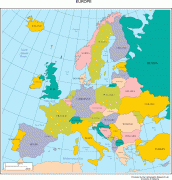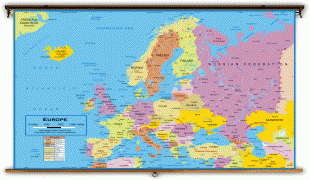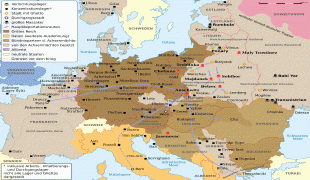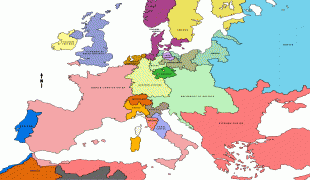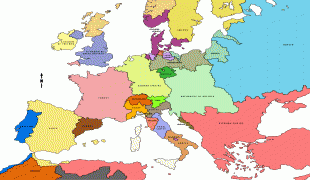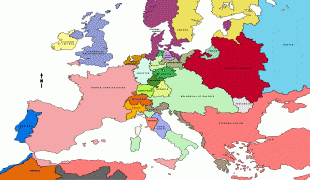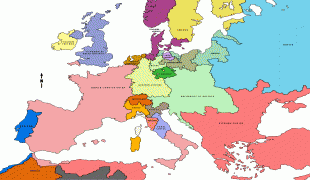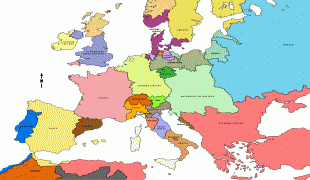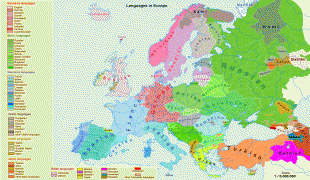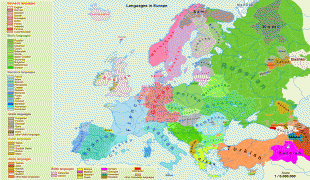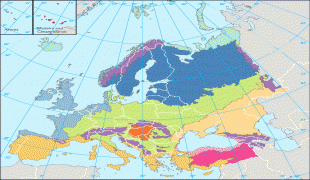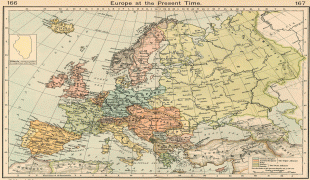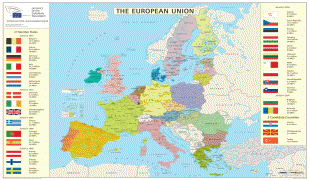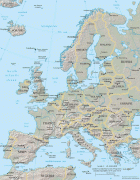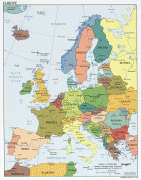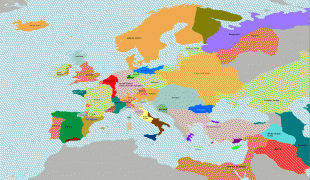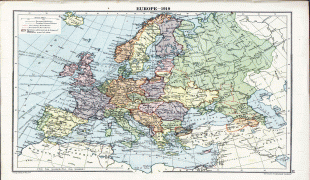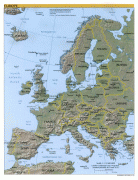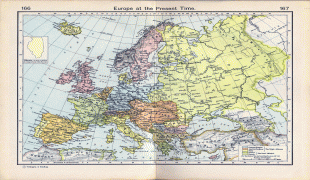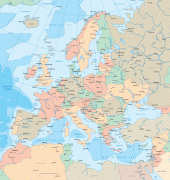Europe
Europe is a continent comprising the westernmost peninsulas of Eurasia, located entirely in the Northern Hemisphere and mostly in the Eastern Hemisphere. It shares the continental landmass of Afro-Eurasia with both Africa and Asia. It is bordered by the Arctic Ocean to the north, the Atlantic Ocean to the west, the Mediterranean Sea to the south, and Asia to the east. Europe is commonly considered to be separated from Asia by the watershed of the Ural Mountains, the Ural River, the Caspian Sea, the Greater Caucasus, the Black Sea and the waterways of the Turkish Straits.
Europe covers about 10.18 e6km2, or 2% of Earth's surface (6.8% of land area), making it the second-smallest continent (using the seven-continent model). Politically, Europe is divided into about fifty sovereign states, of which Russia is the largest and most populous, spanning 39% of the continent and comprising 15% of its population. Europe had a total population of about million (about 10% of the world population) in. The European climate is largely affected by warm Atlantic currents that temper winters and summers on much of the continent, even at latitudes along which the climate in Asia and North America is severe. Further from the sea, seasonal differences are more noticeable than close to the coast.
European culture is the root of Western civilisation, which traces its lineage back to ancient Greece and ancient Rome. The fall of the Western Roman Empire in 476 CE and the related Migration Period marked the end of Europe's ancient history, and the beginning of the Middle Ages. Renaissance humanism, exploration, art, and science led to the modern era. Since the Age of Discovery, started by Spain and Portugal, Europe played a predominant role in global affairs. Between the 16th and 20th centuries, European powers colonised at various times the Americas, almost all of Africa and Oceania, and the majority of Asia.
The Age of Enlightenment, the French Revolution and the Napoleonic Wars shaped the continent culturally, politically and economically from the end of the 17th century until the first half of the 19th century. The Industrial Revolution, which began in Great Britain at the end of the 18th century, gave rise to radical economic, cultural and social change in Western Europe and eventually the wider world. Both world wars began and were fought to a great extent in Europe, contributing to a decline in Western European dominance in world affairs by the mid-20th century as the Soviet Union and the United States took prominence. During the Cold War, Europe was divided along the Iron Curtain between NATO in the West and the Warsaw Pact in the East, until the Revolutions of 1989, Fall of the Berlin Wall and the Dissolution of the Soviet Union.
The European Union (EU) and the Council of Europe are two important international organizations aiming to represent the European continent on a political level. The Council of Europe was founded in 1948 with the idea of unifying Europe to achieve common goals and prevent future wars. Further European integration by some states led to the formation of the European Union, a separate political entity that lies between a confederation and a federation. The EU originated in Western Europe but has been expanding eastward since the fall of the Soviet Union in 1991. A majority of its members have adopted a common currency, the euro, and a large bloc of countries, the Schengen Area, have abolished internal border and immigration controls.
In classical Greek mythology, Europa (Εὐρώπη, ) was a Phoenician princess. One view is that her name derives from the Ancient Greek elements εὐρύς 'wide, broad', and ὤψ (, gen. ὠπός, ) 'eye, face, countenance', hence their composite would mean 'wide-gazing' or 'broad of aspect'. Broad has been an epithet of Earth herself in the reconstructed Proto-Indo-European religion and the poetry devoted to it. An alternative view is that of Robert Beekes, who has argued in favour of a Pre-Indo-European origin for the name, explaining that a derivation from would yield a different toponym than Europa. Beekes has located toponyms related to that of Europa in the territory of ancient Greece, and localities such as that of Europos in ancient Macedonia.
There have been attempts to connect to a Semitic term for west, this being either Akkadian meaning 'to go down, set' (said of the sun) or Phoenician 'evening, west', which is at the origin of Arabic and Hebrew. Martin Litchfield West stated that "phonologically, the match between Europa's name and any form of the Semitic word is very poor", while Beekes considers a connection to Semitic languages improbable.
Most major world languages use words derived from or Europa to refer to the continent. Chinese, for example, uses the word Ōuzhōu (歐洲/欧洲), which is an abbreviation of the transliterated name Ōuluóbā zhōu (歐羅巴洲) (zhōu means "continent"); a similar Chinese-derived term Ōshū (欧州) is also sometimes used in Japanese such as in the Japanese name of the European Union, Ōshū Rengō (欧州連合), despite the katakana Yōroppa (ヨーロッパ) being more commonly used. In some Turkic languages, the originally Persian name ('land of the Franks') is used casually in referring to much of Europe, besides official names such as or.
Europe covers about 10.18 e6km2, or 2% of Earth's surface (6.8% of land area), making it the second-smallest continent (using the seven-continent model). Politically, Europe is divided into about fifty sovereign states, of which Russia is the largest and most populous, spanning 39% of the continent and comprising 15% of its population. Europe had a total population of about million (about 10% of the world population) in. The European climate is largely affected by warm Atlantic currents that temper winters and summers on much of the continent, even at latitudes along which the climate in Asia and North America is severe. Further from the sea, seasonal differences are more noticeable than close to the coast.
European culture is the root of Western civilisation, which traces its lineage back to ancient Greece and ancient Rome. The fall of the Western Roman Empire in 476 CE and the related Migration Period marked the end of Europe's ancient history, and the beginning of the Middle Ages. Renaissance humanism, exploration, art, and science led to the modern era. Since the Age of Discovery, started by Spain and Portugal, Europe played a predominant role in global affairs. Between the 16th and 20th centuries, European powers colonised at various times the Americas, almost all of Africa and Oceania, and the majority of Asia.
The Age of Enlightenment, the French Revolution and the Napoleonic Wars shaped the continent culturally, politically and economically from the end of the 17th century until the first half of the 19th century. The Industrial Revolution, which began in Great Britain at the end of the 18th century, gave rise to radical economic, cultural and social change in Western Europe and eventually the wider world. Both world wars began and were fought to a great extent in Europe, contributing to a decline in Western European dominance in world affairs by the mid-20th century as the Soviet Union and the United States took prominence. During the Cold War, Europe was divided along the Iron Curtain between NATO in the West and the Warsaw Pact in the East, until the Revolutions of 1989, Fall of the Berlin Wall and the Dissolution of the Soviet Union.
The European Union (EU) and the Council of Europe are two important international organizations aiming to represent the European continent on a political level. The Council of Europe was founded in 1948 with the idea of unifying Europe to achieve common goals and prevent future wars. Further European integration by some states led to the formation of the European Union, a separate political entity that lies between a confederation and a federation. The EU originated in Western Europe but has been expanding eastward since the fall of the Soviet Union in 1991. A majority of its members have adopted a common currency, the euro, and a large bloc of countries, the Schengen Area, have abolished internal border and immigration controls.
In classical Greek mythology, Europa (Εὐρώπη, ) was a Phoenician princess. One view is that her name derives from the Ancient Greek elements εὐρύς 'wide, broad', and ὤψ (, gen. ὠπός, ) 'eye, face, countenance', hence their composite would mean 'wide-gazing' or 'broad of aspect'. Broad has been an epithet of Earth herself in the reconstructed Proto-Indo-European religion and the poetry devoted to it. An alternative view is that of Robert Beekes, who has argued in favour of a Pre-Indo-European origin for the name, explaining that a derivation from would yield a different toponym than Europa. Beekes has located toponyms related to that of Europa in the territory of ancient Greece, and localities such as that of Europos in ancient Macedonia.
There have been attempts to connect to a Semitic term for west, this being either Akkadian meaning 'to go down, set' (said of the sun) or Phoenician 'evening, west', which is at the origin of Arabic and Hebrew. Martin Litchfield West stated that "phonologically, the match between Europa's name and any form of the Semitic word is very poor", while Beekes considers a connection to Semitic languages improbable.
Most major world languages use words derived from or Europa to refer to the continent. Chinese, for example, uses the word Ōuzhōu (歐洲/欧洲), which is an abbreviation of the transliterated name Ōuluóbā zhōu (歐羅巴洲) (zhōu means "continent"); a similar Chinese-derived term Ōshū (欧州) is also sometimes used in Japanese such as in the Japanese name of the European Union, Ōshū Rengō (欧州連合), despite the katakana Yōroppa (ヨーロッパ) being more commonly used. In some Turkic languages, the originally Persian name ('land of the Franks') is used casually in referring to much of Europe, besides official names such as or.






